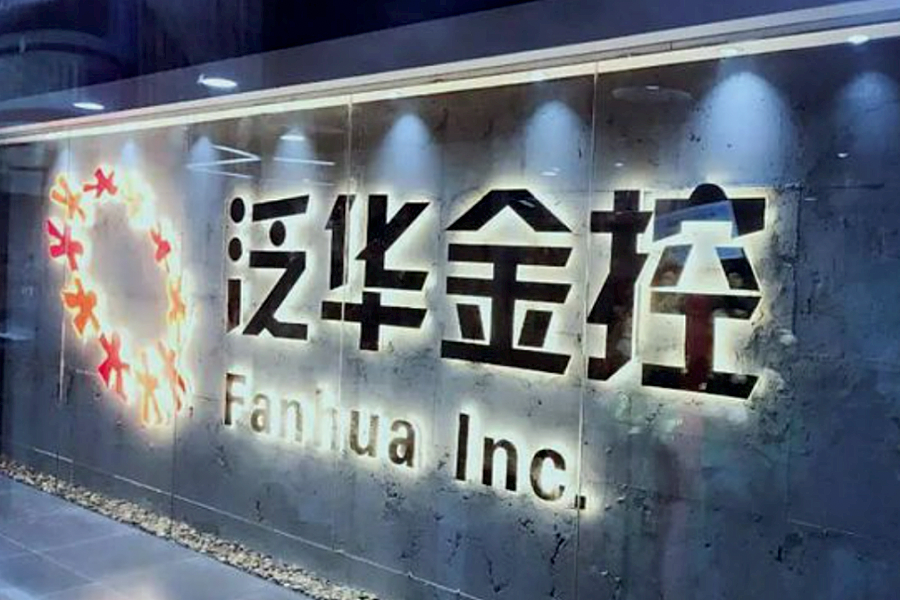Fanhua Decides to Stay on Wall Street, Citing Improving U.S.-China Climate

The insurance broker’s founder withdrew his privatization bid launched a year ago, saying the risk of Chinese companies being forced to de-list from New York has been ‘substantially’ reduced
Key Takeaways:
- Fanhua founder Hu Yinan said he has withdrawn his bid to privatize the company following positive developments in cooperation between the U.S. and Chinese securities regulators
- Hu said that following those developments, he believes that maintaining Fanhua’s U.S. listing ‘is more in the long-term interest of the company’
By Doug Young
At first glance, Chinese insurance broker Fanhua Inc.’s (FANH.US) new announcement of the withdrawal of a bid to privatize the company looks like more of the same. Such on-again-off-again privatization announcements have become common among U.S.-listed China stocks over the last two years as the group came under an unprecedented series of assaults from both Beijing and Washington.
The typical cycle would see a company’s stock fall to fresh lows, prompting groups, often led by a company’s top managers, to launch privatization bids at a fraction of the company’s value before all the controversy began. But rather than rise in response to such offers, shares would often continue to fall as the U.S. and China continued to stoke fears about the future of these companies.
As a result, the management-led buyout groups would typically withdraw their offers, or just let them lapse. Sometimes they would submit new buyout offers at lower prices to reflect the big stock declines, though those were less common since the stocks would often just continue to fall.
Against that backdrop, the Friday headline after markets closed saying “Fanhua Announces Withdrawal of Non-binding Going Private Proposal” looked like business as usual, and was probably ignored by the majority of investors rushing to start their Christmas holiday. But a closer look at the content of the announcement was quite new, and something we haven’t seen before.
Fanhua founder Hu Yinan explained that he made his original privatization bid a year earlier in response to conditions at that time, saying the move was aimed at driving an “internal strategic transformation of the company.”
Fast forward to the present, when the environment that prompted him to launch the bid has changed markedly. Most significantly, the U.S. and China signed a landmark deal in August giving the former access to China-based accounting records for U.S.-listed Chinese companies – once considered “state secrets” by China and off-limits to U.S. regulators.
Failure to reach such a deal could have resulted in the forced de-listing of the more than 200 U.S.-traded Chinese stocks, including the likes of e-commerce giant Alibaba (BABA.US; 9988.HK), with a market value of $250 billion.
Following the deal’s signing, a team of inspectors from the U.S. Public Company Accounting Oversight Board (PCAOB), the accounting arm of the U.S. securities regulator, traveled to Hong Kong in September to conduct some trial audits. That team gave a strong endorsement of the deal earlier this month, saying it had received “complete access” to the information it was seeking.
Hu specifically referenced that development in explaining the reasons for his latest decision to withdraw his offer.
“In view of the recent announcement by the Public Company Accounting Oversight Board, which substantially eases the de-listing risk of China-based U.S.-listed companies and the preliminary successful results of the company’s strategic transformation, I believe that maintaining the company’s listing status in the U.S. is more in the long-term interest of the company.”
Others to follow?
Hu’s assessment is one of the clearest signals yet that the de-listing risk for Chinese companies is rapidly fading, and we suspect we’ll see similar signs of renewed confidence in the months ahead from other companies. The other major overhang for Chinese companies, which came from a series of regulatory crackdowns at home by Beijing, also seems to be rapidly fading as China switches its focus from Covid control to salvaging its sputtering economy.
Fanhua’s shares rose 3.2% on Tuesday in New York, the first trading day after its announcement. But the stock is up 68% since Nov. 21, the date of its last quarterly results announcement, mirroring similar gains by many Chinese stocks in recent weeks. If it can maintain those gains, Fanhua’s stock – which is now up 8% year-to-date – could actually end 2022 in positive territory, something very few U.S. stocks can say.
The company’s shares now trade at a fairly high trailing price-to-earnings (P/E) ratio of 72. But the figure drops sharply to 20 on a forward basis, on expectation its profits will rise sharply next year as China finally abandons its “zero Covid” strategy and business returns to more normal conditions. The forward figure is still well ahead of most of its peers, including 9 times for online insurer ZhongAn (6060.HK), and just 6.5 times for giant Ping An (2318.HK; 601318.SH).
Fanhua’s big premium probably owes at least partly to its business model as an insurance broker, which naturally puts it at lower risk than actual underwriters like ZhongAn and Ping An. At the same time, Fanhua has consistently operated in the black in recent years, unlike many of its younger private peers like Huize (HUIZ.US) and Waterdrop (WDH.US), though we should note that Waterdrop recently achieved its first-ever quarterly profit.
Fanhua’s latest results reflect a bumpy performance that we’ve seen for many Chinese companies this year due to major disruptions created by frequent Covid control measures that culminated with massive lockdowns in several major cities in the second and third quarters. Thankfully, the country finally abandoned that approach earlier this month, and it appears things could start to return to more normal conditions as we head into 2023.
Fanhua’s revenue fell 8.6% year-on-year in the third quarter to 624.7 million yuan ($90 million), though its net income rose 3.3% to 35.4 million yuan. That divergence reflects a broader trend among Chinese companies lately, as they move to cut costs and improve efficiency during these difficult times. Fanhua reduced its total third-quarter operating costs and expenses by 9.6%, helping to improve its operating margin to 5.1% from 4.1% a year earlier.
At the end of the day, this kind of cost cutting looks like a good exercise by forcing companies like Fanhua to trim the fat they’ve accumulated over the years during more prosperous times in China. That should make this broader group of companies that much leaner and more efficient, able to prosper again when times get better again, which could quite possibly happen in 2023.
To subscribe to Bamboo Works weekly newsletter, click here






